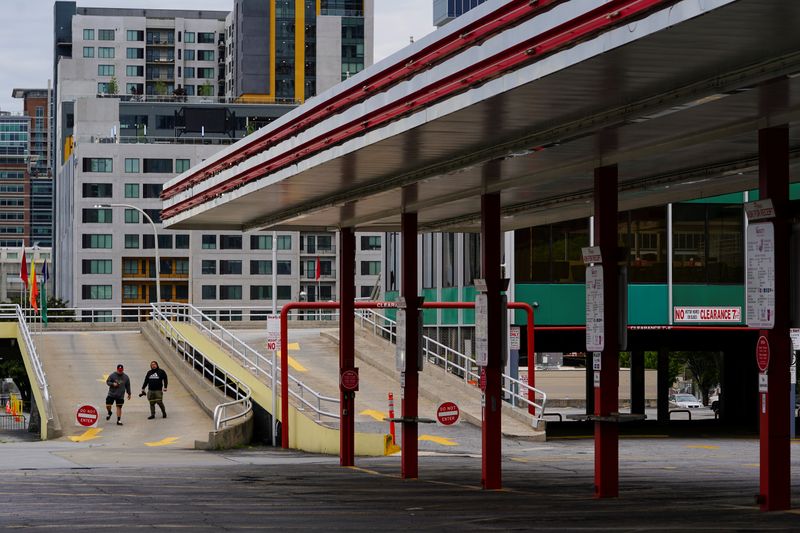
ATLANTA (Reuters) – An array of U.S. merchants in Georgia and several other states prepared on Thursday to reopen for the first time in a month under newly relaxed coronavirus restrictions, as another week of massive unemployment claims highlighted the grim economic toll of the pandemic.
From Tennessee and Texas to Ohio and Montana, a handful of governors around the country have announced plans to swiftly allow the reopening of some workplaces that had been ordered closed as a way of curbing the spread of the coronavirus.
Those plans have drawn fire from public health experts and other governors who warn that a premature easing of stay-at-home orders and business closures imposed over the past five weeks could trigger a renewed surge in coronavirus cases.
Georgia Governor Brian Kemp, a Republican, has cleared the way for gyms, hair salons, bowling alleys and tattoo and massage parlors to resume business on Friday, followed by movie theaters and restaurants next week. South Carolina began to ease restrictions on Monday. Florida opened some of its beaches last Friday.
Some business owners, despite the financial blow of the forced closures, were less than enthusiastic about reopening just yet.
“No way is it safe,” said Michael Sponsel, 39, owner of the Freedom Barber shop in Atlanta, the capital and largest city of Georgia. “Not for my barbers, not for my customers. We looked at the numbers and they don’t look good.”
He told Reuters he planned to keep his doors closed.
Georgia has recorded nearly 850 deaths out of more than 21,000 cases, the 11th-highest fatality toll among the 50 U.S. states.
Others were more sanguine. Angie Bullman said she would reopen her suburban Atlanta hair salon on Friday and was fully booked for the weekend.
“We got to get back to work,” Bullman said.
JOB GAINS ERASED
Millions of Americans share their pain. U.S. Labor Department data released on Thursday showed 26.5 million Americans had sought jobless benefits over the last five weeks, effectively erasing all jobs gained during what had been the longest economic expansion in U.S. history and rendering a level of unemployment not seen since the Great Depression of the 1930s.
While some idled workers have welcomed moves to reopen the economy, others fearful of returning before it is safe to do so face a quandary – state unemployment laws generally bar them from collecting jobless benefits if they refuse work, said Thomas Smith, an associate professor at Emory University’s Goizueta Business School.
“You’re asking people to put their life on the line,” Smith said. “These people aren’t Army Rangers – those people signed up for combat. A barber did not.”
More than 870,000 Americans are known have been infected and over 49,300 have died of COVID-19, the highly contagious respiratory illness caused by the coronavirus, according to a Reuters tally.
Although the rate of hospitalizations and other indicators of the outbreak’s severity have begun to level off in recent days, California registered its highest single-day loss of life to date, with 115 deaths reported over the previous 24 hours.
California Governor Gavin Newsom urged state residents to follow stay-at-home orders despite weekend forecasts of warm, sunny weather that could tempt many to beaches officially still closed. He appealed to those who do visit the shore to at least practice social-distancing, saying, “Otherwise, I’m going to be announcing in a week or so that these numbers (of hospitalizations) are going back up.”
‘TOO SOON’
President Donald Trump, who had touted a strong economy as a pillar of his November re-election bid, has been agitating for a swift resumption of U.S. commerce. But he shifted gears this week and broke with the Georgia governor over his plan to reopen some businesses on Friday.
“It’s just too soon. I think it’s too soon,” Trump said at his daily coronavirus briefing on Wednesday.
Vice President Mike Pence said on Thursday that federal guidelines issued last week for lifting business restrictions are “what we believe is the best counsel for how to safely and responsibly reopen,” adding that such choices ultimately rest with state governors.
Rather than permitting companies to reopen their doors to customers, some states, including Wisconsin and Illinois, were taking a more cautious approach by allowing merchants to conduct curb-side business, while requiring face-coverings in the workplace.
Several opinion polls have shown a bipartisan majority of Americans want to remain at home to protect themselves from the coronavirus, despite the impact to the economy.
Only 13% of Americans polled in a CBS News survey released on Thursday said they would definitely return to public places over the next few weeks if restrictions were lifted now, no matter the status of the outbreak.
Almost half — 48% — said they would not return to public places until confident the outbreak was over, according to the April 20-22 poll. Another 39% said “maybe,” depending on whether they believed it was getting safer.
After days of political wrangling, the U.S. House of Representatives returned to Washington to pass a $484 billion coronavirus relief bill, funding small businesses and hospitals and pushing the total spending response to the crisis to nearly $3 trillion.
The measure was expected to receive bipartisan support, and Trump has promised to sign it swiftly into law.



